1971: Super Bowl VI - Dallas Cowboys vs Miami Dolphins: Pregame
This series covers the history of the NFL through the prism of its yearly championship games.
Note: The gray boxes contain asides that provide interesting material but could be skipped
without losing the continuity of the article.
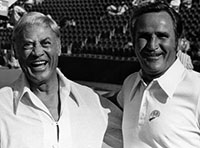
Don Shula and Carroll Rosenbloom in happier times
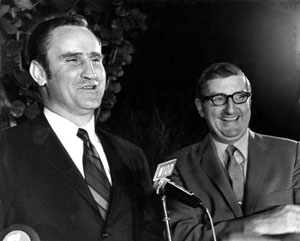
Shula and Joe Robbie at press conference announcing his contract with Miami
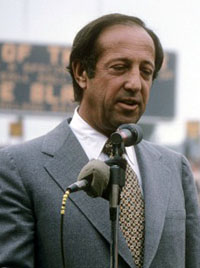
Pete Rozelle
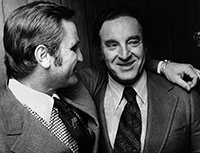
Shula and Joe Thomas
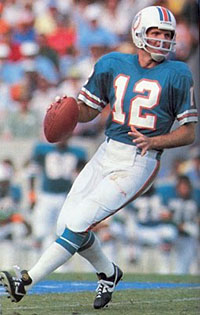
Bob Griese
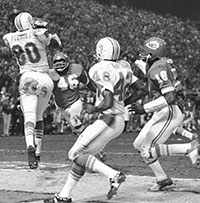
Marv Fleming catches TD pass in two OT game vs Kansas City
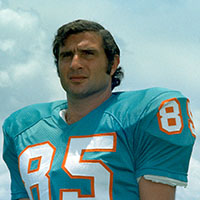
Nick Buoniconti
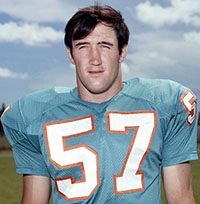
Mike Kolen
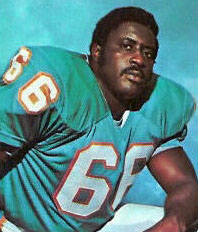
Larry Little
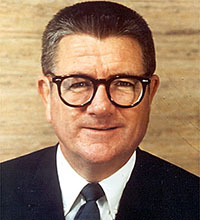
Clint Murchison
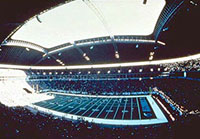
Texas Stadium
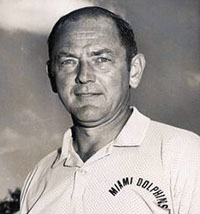
Bill Arnsparger
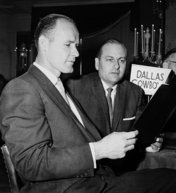
Tom Landry and Hank Schramm
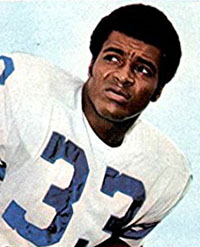
Duane Thomas
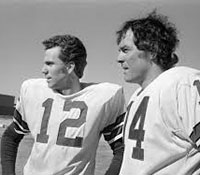
Roger Staubach and Craig Morton
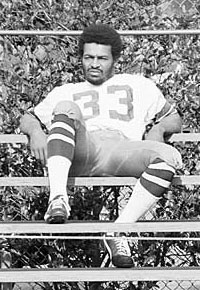
Duane Thomas not talking on Media Day in New Orleans
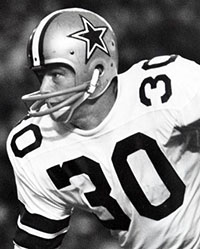
Dan Reeves
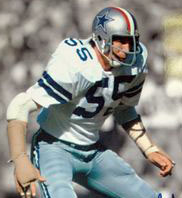
Leroy Jordan
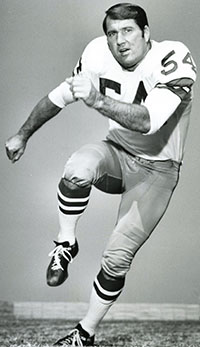
Chuck Howley
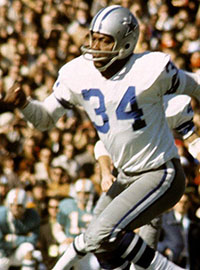
Cornell Green
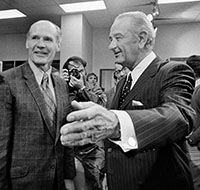
Tom Landry and Lyndon Johnson
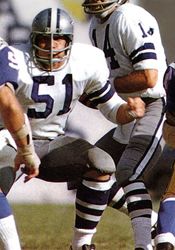
Dave Manders
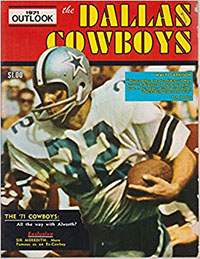
Walt Garrison
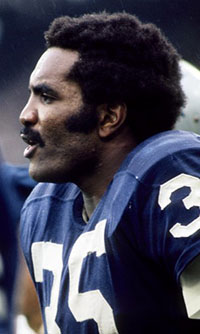
Calvin Hill
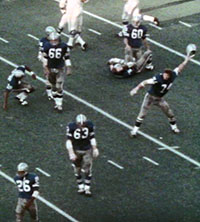
Bob Lilly throws his helmet after Colts kick winning FG in Super Bowl V
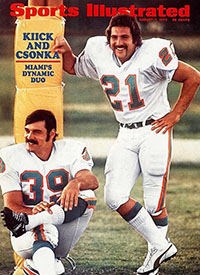
Larry Csonka and Jim Kiick on the cover of Sports Illustrated 8/7/72
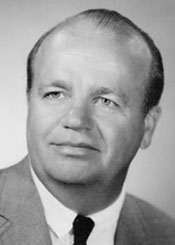
Ray Scott
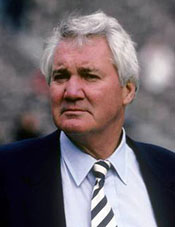
Pat Summerall
|
After his Baltimore Colts were upset in Super Bowl III, Don Shula coached the team one more season.
- He had become head coach in 1963 at the age of 33, succeeding Weeb Ewbank, who left for the New York Jets of the AFL after leading Baltimore to the 1958 and '59 NFL titles.
- In Shula's second season, the Colts won the Western Division championship, although they lost to the Browns in the title game.
- But after his '68 Colts won the NFL with a 15-1 mark only to lose to Ewbank's upstart Jets in Super Bowl III, Don's club slumped to 8-5-1 the following year.
- Shula recalled: After Super Bowl III, my relationship with (owner Carroll) Rosenbloom was not very pleasant. I loved Baltimore - the people, the fans, and everything that Colts football stood for. But Rosenbloom's New York buddies never let him forget (the loss to the Jets), and he never let me forget it. If we had won that game and continued to win, I certainly wouldn't have gone. I'd still be in Baltimore, eating crab cakes.
Baltimore's loss proved to be Miami's gain.
Still only 40 years old, Shula set about turning the Dolphins into a winning team with the help of Joe Thomas, the only GM in franchise history to that point.
- "Miami Gets a Miracle Worker" shouted the headline on an article in the September 7, 1970, edition of Sports Illustrated.
- Don inherited some talented players, including QB Bob Griese, RB Jim Kiick, FB Larry Csonka, and LB Nick Buoniconti.
- A month before Shula signed on as head coach, Thomas made a trade that would help Shula build a contending team. Hoping to land a top-notch QB, the Browns relinquished 27-year-old WR Paul Warfield for Miami's first-round pick in the 1970 NFL Draft.
- The Dolphins also picked up TE Marv Fleming from the Packers to provide veteran leadership from someone who had played in the first two Super Bowls.
- Even without the first round pick, the Dolphins managed to draft three rookies who would contribute immediately:
2nd round - TE Jim Mandich
7th round - S Jake Scott
12th round - LB Mike Kolen
- Shula and his staff improved the Dolphins immediately, especially on defense, his forte. They scored 297 points in 1970, 64 more than the previous season, and gave up only 228, a whopping 104 points better than the '69 club. Consequently, Miami finished 10-4 in 1970, a 7 1/2 game improvement from '69. That brought the franchise not only its first winning season but also its first playoff appearance, although they lost to the Oakland Raiders in the AFC Divisional Game.
Long after his retirement, Dolphins G Larry Little, by then a member of the Pro Football Hall of Fame, was asked, What was the most dramatic change that occurred when Shula took over the Dolphins in 1970?
Here was his answer: Hard work. We worked three times as hard with Shula. With George, training camp was almost like a country club. On a hot day, Wilson would come out on the field and say, "What the hell - it's too hot. Go get in the pool." We'd miss a day of practice. But with Shula? No way we'd ever think of missing a day of practice because it was too hot! When Shula got there, we didn't have any time to spend sitting in a swimming pool.
South Florida looked forward to the 1971 season with great anticipation.
The AFC champions were a relatively young team, which boded well for the future.
The Dallas Cowboys began the '71 campaign still wondering how they lost Super Bowl V.
- Like the Dolphins, Dallas fielded essentially the same team as in 1970.
- What was new, however, was the venue. Texas Stadium in Irving, a western suburb of Dallas, was built for football only unlike other new stadiums in Atlanta, Philadelphia, Cincinnati, and Pittsburgh that were used for baseball as well.
- Many commentators regarded owner Clint Murchison's crown jewel as the finest football stadium in the land. It featured private boxes for wealthy fans who wanted to enjoy the game in comfort. The partial roof covered the stands but not the Tartan Turf playing field.
Opinions differed as to why Murchison left a hole in the roof. With typical Cowboys arrogance, LB D.D. Lewis said the reason was so that God could watch his favorite team play on Sundays. Murchison said, I don't like watching football in the Astrodome. Our fans are protected but can still see the sky. But the real reason was probably more mundane. Enclosing the entire stadium would require huge air conditioning costs.
Before training camp, Dallas GM Tex Schramm had to deal with RB Duane Thomas, who had an outstanding rookie season in 1970, gaining 803y to finish #8 in the league despite the fact that he started only eight games.
A more pressing problem for head coach Tom Landry in training camp was deciding on a quarterback.
- Tom praised both contenders, Craig Morton and Roger Staubach. All I can say about Morton is that he was hurt for two years and did a fine job considering. Landry said Roger was ready to actually go in there and carry the team. All Roger has ever needed is experience.
Morton had played through pain caused by a pinched nerve and floating bone chips in his throwing elbow during the 1970 season. After a March 1971 operation, his arm felt better than it had in years. When he was finally cleared to throw again, Craig said, I didn't get any tingle or sharp pain. I could wing the sideline pattern and also throw the bomb.
- When the season started, Landry still hadn't made a decision. So he alternated quarterbacks possession by possession. In Game 7, a loss to the Bears, they alternated plays.
- With a 4-3 record at that point despite having the easiest non-division schedule in the league, Landry finally settled on Staubach, relegating Morton to the bench. The result was a seven-game winning streak to finish the regular season and the franchise's sixth straight division title.
- The playoffs began with a 20-12 Christmas victory in the snow at Minnesota. Then the defense smothered the potent 49ers attack 13-3 at home to put the Cowboys in the Super Bowl for the second straight year.
The AFC championship game was played after the NFC game. So most of the Cowboys watched and rooted for the Colts because they wanted a chance to get revenge for the defeat in Super Bowl V.
So the Cowboys earned another chance to win the NFL championship after five frustrating shots at the brass ring.
The '71 Cowboys didn't celebrate their NFC championship since they considered it merely a stepping stone to their ultimate goal - victory in Super Bowl VI.
- Coach Tom Landry told the press the next day: I've never been in a locker room that took a big win like that so easy. But I've never been with a team that lost the Super Bowl the year before, either. They've felt all year that this is where they belonged.
- Staubach after the victory over the 49ers: This is the culmination of an unbelievable year. We deserve to win the Super Bowl.
- RB Dan Reeves: We just had to get back. Once you've been in it and lost - no matter how you lost, that isn't remembered by anyone - then nothing else can satisfy but going back and winning.
- MLB Leroy Jordan: We don't care who we play in the Super Bowl. This time we will win it. I said after the Baltimore game (in Super Bowl V) we would be back.
- OLB Chuck Howley: It's the greatest team I've ever played on. We're too good not to win it all.
- DB Cornell Green: There's no doubt about it. We've had the Super Bowl on our minds since training camp.
- General Manager Tex Schramm: If we'd lost today, it would have meant we'd had a bad season.
The Super Bowl VI teams boasted two of the best defenses in the league.
- The tale of the tape:
Cowboys, #4 in points allowed (221), #4 in total yards allowed (255 ypg),
#3 in passing yards allowed (137 ypg), #10 in rushing yards allowed (118 ypg)
Dolphins, #5 in points allowed (228), #15 in yards allowed (286 ypg), #22 in passing yards allowed (182 ypg), #7 in rushing yards allowed (104 ypg)
- The fact that Miami was fifth in points allowed but only 15th in yards allowed illustrates the "Bend But Don't Break" philosophy of defensive coordinator Bill Arnsparger as well as that of Shula, whose background was in defense.
Shula got help preparing his Super Bowl game plan from an unexpected source. President Richard Nixon, a big football fan, called Don at 1:30 AM the day after the conference championship games. The Miami coach was wide awake, watching a replay of the Dolphins' victory over Baltimore. He alerted me that the Cowboys were a great football team, Shula told the press. But the president said he thought the quick slant pass to Paul Warfield would go against Dallas. ... Mr. Nixon said he didn't get a chance to see the whole game Sunday. He talked technical football and asked me to recreate Dick Anderson's 62-yard interception return. The conversation lasted about 10 minutes. He said it would be impossible for him to make the Super Bowl in New Orleans. He also warned that Dallas had a pretty fair coach in Tom Landry.
When told that Shula had received advice from President Nixon, Landry responded, There's no reason for me to feel neglected. We had Lyndon Johnson in our dressing room (after the 49ers victory).
- Landry said the Dolphins were somewhat of a mystery to him. We haven't played them, and I've only seen them play twice on television. ... I saw the second half of their game against Baltimore, and it was obvious they were a team very well prepared. Whatever Miami tried to do, it did well. I don't think we have an edge because of our Super Bowl experience. Shula offsets any edge we have. He has been down there before.
- Tom was impressed with the Miami defense. I can't recall their names, but they are a matter of great concern to us. That comment led to the nickname "No Name Defense" for the Dolphins' unit.
Within days of the conference championship games, the Dolphins would no longer be a mystery to Landry thanks to pioneering computer software developed in 1965 by an IBM programmer from India who knew little about American football. By 1971, Landry could get statistical breakdowns of opponents - how many times they ran certain plays and the results of those plays. Another component of the software ranked college players based on criteria developed by the scouting department. The system helped the Cowboys uncover gems from small colleges like DT Jethro Pugh from Elizabeth City State and OT Rayfield Wright from Fort Valley State.
- RB Dan Reeves, who doubled as an assistant coach, said that one of Miami's ideal traits could be used against them. The Dolphins are a well-coached young football team. That makes it fairly easy to prepare for them. Because they are disciplined and well-coached, you know exactly what they are going to do.
- Miami's #1 concern was Bob Lilly. Kiick: When you watch as many films as we have, he sort of stands out. Csonka: It doesn't matter whether you run at him or away from him, he always seems to be disrupting the play. LG Bob Kuechenberg was the blocker who would be opposite Lilly. He is a player without weaknesses. He has certain tendencies, but no set patterns like others have. I'll be satisfied if you don't hear his name or mine Sunday.
As the Cowboys began preparations for the Super Bowl, Duane Thomas made news again.
- He skipped practice the Thursday after the NFC Championship Game.
Within hours, Buddy Diliberto of WVUE-TV in New Orleans, citing reliable sources within pro football, reported that Thomas would not play in the Super Bowl. Supposedly, Duane got the idea from the great Jim Brown, who had befriended him, as a ploy to negotiate a better contract.
- All speculation about Thomas's intentions ended the next morning when he arrived for a team meeting, after which he met with Landry for 40 minutes.
- Thomas maintained his silence with the media. Landry said Duane cited "personal reasons" for missing practice the day before. He told me, "My job is football, and I will do my job." ... He didn't specifically say, "I will play in the Super Bowl," but you have to assume that he will because he's here.
Many Cowboys defended Thomas. C Dave Manders said he wasn't bothered by anything Duane had done and added, I think that's true for the majority of the team. Calvin Hill: I'll tell you one thing: This guy is one fine football player. I only wish I could block as well for him as he does for me.
Landry revamped his preparation schedule considerably from what he had done the year before.
- The previous January, the coaching staff had treated the first of the two weeks between the conference championship game and the Super Bowl like a game week during the regular season.
- The idea was to put in the game plan by midweek and practice it through the weekend. That way, the players could simply review their assignments the second week at the site of the game where they faced so many distractions.
- But the plan backfired because the Cowboys played like a stale team in the "Blunder Bowl" against the Colts.
- So Landry tried a different approach. We have been mixing up the practices this week with a little bit of everything - trying this and that. We haven't set our game plan yet. We'll put that in next week in New Orleans.
Just before the Cowboys boarded the plane for the Crescent City, Landry received a telegram.
MY PRAYERS AND MY PRESENCE WILL BE WITH YOU IN NEW ORLEANS, ALTHOUGH I DO NOT PLAN TO SEND IN ANY PLAYS. LYNDON B. JOHNSON
The site of Super Bowl VI resulted from a compromise by the league owners.
- When the owners discussed the host city, Dallas owner Clint Murchison proposed his new Texas Stadium as the site.
- However, the AFC owners rejected that idea out of fear that would give the Cowboys a home game in Super Bowl VI. They proposed the Orange Bowl in Miami instead.
- The NFC contingent got even by rejecting that choice as well. Otherwise, the Dolphins would have played Super Bowl VI on their home field.
- The owners compromised on New Orleans since the Saints, who started as an NFL expansion franchise for the '67 season, would most certainly not be playing in the game.
- It would be the Big Easy's second Super Bowl after hosting game IV between the Chiefs and Vikings.
Both teams arrived in New Orleans the Sunday night before the January 16 game.
- The Cowboys stayed at the Hilton Inn across from the airport and practiced at the Saints' facilities on nearby David Drive.
Chuck Howley, who had won the MVP award in Super Bowl V despite the Cowboys losing the game: It was a totally different feeling going back the second time. ... The way we looked at it, we had X amount of games to go through in order to repeat and do what we didn't do the year before. ... Nobody questioned the fact that we were going to win. It wasn't cockiness ... I just knew there was no doubt we were going to win that ballgame.
- Observers noted how loose and relaxed Landry appeared. It was not a false front as he knew he had the better team and an excellent game plan. He admitted he was confident his Cowboys would win Super Bowl VI. If we don't, I might throw my hat downfield like Bob Lilly did his after we lost to Baltimore last year. We've been looking forward to this since we stepped off the field in Miami last year. We have a much more determined approach ... We're a little bit impatient. We want to get on with it.
The game would have special significance for one Cowboy. Dan Reeves, who doubled as RB coach, was expected to retire afterwards. With these knees of mine, it is not fair to myself to continue playing. I'm not certain yet, but right now I feel I'll go strictly into coaching after this one.
- He set no curfew for Sunday, Monday, and Tuesday nights. That'll give them three nights to get the French Quarter out of their system. By Wednesday, I hope they'll be sick of it. However, they had to be in by midnight Wednesday, Thursday, and Friday, and by 11 PM Saturday - the usual curfew the night before a game.
To wall off distractions, the Cowboys cut off calls to the players' rooms at night and hired extra security around the hotel to keep family, friends, and fans from disturbing the players.
- Reporters wanted to know if Duane Thomas would end his silence and talk to the media. Schramm answered, Thomas's actions are a team matter. I'm sure the league will let us work it out. As long as he reports to practice and plays, he's fulfilling his contract. There's no stipulation in the contract that requires him to grant interviews.
On media day Monday, Thomas reclined in the bleachers while his teammates obliged the press. Leave me alone, he told reporters. I don't want to talk to anybody.
- Roger Staubach noted the contrast between this Media Day and the one the year before when he was Morton's backup. I had more interviews the first two minutes I was here than I had all last year. Roger commented on the contrast between himself and his counterpart, Bob Griese. He has more experience and possesses a better feel of the game. Griese calls his own plays, and his selection is based on what he feels will go. I'm not complaining that coach (Landry) calls the plays. In a way, it's a burden off my shoulders. However, Roger admitted, I'm not too often thinking the same play that he sends in. I know from field position and the hash marks what two or three plays might be coming. But it's not usually the one I'd select. However, he was so well-versed in the game plan that if anything happened to Coach Landry, I could take over.
Staubach, the devout Catholic, spent most nights in New Orleans in Landry's room watching game films. Roger went to a movie one night and had dinner with his wife and her parents Friday night. New Orleans is a fascinating place to visit for three or four days if you have nothing on your mind, he said. But Sunday is what it's all about for us. I've got to keep channeled in that direction.
- RB Calvin Hill strained a knee ligament in the NFC Championship Game. Landry said that he'd go with Walt Garrison if Hill wasn't ready. Walt had a great second half against the 49ers, but I'll go with my two big backs, Hill and Duane Thomas, if Hill is ready.
- The Dallas coach praised Miami's defense. Our shifting and motion won't confuse them that much, but it might tax them mentally. Staubach added: We know they are going to be sitting back in the zone, but they do the best job we've seen in disguising what type of zone they're playing. You just have to find cracks or seams in whatever they're playing. That's why teams this year are going more to the short passes between defenders and screens so much.
- The Cowboys knew Dolphins' star WR Paul Warfield only too well. He had sparked the Browns to playoff victories over Dallas in both 1968 and 1969, catching a total of 12 passes for 185y, much of it on slants across the middle.
- But Landry felt his two cornerbacks, Cornell Green and Mel Renfro, could handle Warfield and his fellow WR Howard Twilley one-on-one. That allowed him to use aggressive S Cliff Harris like an extra linebacker to stop Csonka and Kiick.
Bob Lilly recalled: We arrived in New Orleans with a ten-game winning streak and were playing outstanding football. We felt that all we had to do was continue doing the things we'd been doing for weeks. There was such an atmosphere of confidence. ... I watched more film of the Dolphins than any other game. They were a fine football team, and they had the best team I had seen since the Packers, especially offensively. ... They were scary to watch because nobody had really stopped them.
- After media day, Landry closed his practices. Having reporters and cameramen around tends to hinder our concentration. I would like to watch Miami workout, and I'm sure they would appreciate knowing what our game plan will be. It's best for all that all sessions be closed to outsiders.
Mel Renfro: Against the Dolphins, Tom used the KISS theory: Keep It Simple, Stupid. ... We knew we had to eliminate Warfield. We had good talent at LB, so we could control their TE, which allowed us to double their WRs.
Cornell Green: Our whole game was to stop the running game and Paul Warfield. If they were going to beat us, they were going to beat us with Twilley and Fleming.
Miami established headquarters at the Fontainebleau Hotel, where the Chiefs stayed prior to their victory in Super Bowl IV. The Dolphins practiced at Tulane.
- Shula's body language contrasted with that of his Dallas counterpart. Don seemed tense and ill at ease, feeling the pressure of making up for the embarrassing loss to the Jets.
- Unlike Super Bowl III with the Colts, Shula brought his players to New Orleans without their wives and children. We hope to be more business-like here, said Don. There was too much confusion three years ago (when his Colts lost to the Jets). We were in a hotel on the beach (in Miami), and there was a lot of activity there. The families won't come down until Saturday this time.
- Don had no problem with the Cowboys being established a 4.5-point favorite. We're a young team, and they've been a great team over a number of years. They're so much more experienced than we are. I don't pay much attention to odds, but they certainly should be the favorites. Still, he believed his team would win although I'm not guaranteeing anything.
- MLB Nick Buoniconti likened Dallas's offense to that of Kansas City. They both run the multiple offense and are physically similar ... Basically the idea behind the varied sets and formations is to confuse the defense. ... It's hard to say in number of hours how much time we've put into it (preparing for the Cowboys the week before). ... But as far as the game plan is concerned, I already have a good idea of what we can and should do ...
- Griese insisted the Super Bowl was just another football game, a comment that provoked laughter among the Cowboys.
Many articles on the upcoming game focused on the "Butch Cassidy and Sundance Kid" tandem of pro football - Miami's FB Larry Csonka and HB Jim Kiick.
The nicknames came from a 1969 movie starring Paul Newman and Robert Redford. The Dolphins duo added some color to two bland teams.
- Csonka and Kiick had been roommates since they joined the Dolphins in 1968. We devise ways of blocking and helping each other gain yardage, said Larry.
- The 6-3, 235 lb fullback from Syracuse battered opposing defenses for 1,051y, third in the league in 1971, while the 5-11 215 lb HB from Wyoming added 738 on the ground and another 338 on pass receptions. Add Larry's 113y on only 13 receptions, and you have 2,240y or 50.7% of Miami's total offense.
The only other RB tandem that came close to Butch and Sundance was Ken Willard and Vic Washington of San Francisco with 2185y of total offense or 46.4% of the team's total.
- Larry and Jim had only one fumble between them in 429 carries for the entire 1971 season, including the playoffs.
Dallas DB Cornell Green, after studying films of the rugged Miami duo, had an explanation for their lack of fumbles. As big as Csonka is and tough as Kiick is, I don't think anybody wanted to hit them hard enough to make them fumble.
Green had an unusual background for an NFL player. He had never played football - not even in high school. Instead, he was a two-time All-American basketball player for Utah State who was selected in the 1962 NBA draft. The Cowboys signed him as a free agent for $1,000
that year because of his speed and quickness. Personnel director Gil Brandt explained the move. Tom wasn't looking for football players. He wanted athletes that fit into his offensive and defensive schemes because he wanted players who were athletic enough to adapt to different situations. Green never expected to make the Dallas team, but he impressed Landry enough to start three games and be selected to the NFL All-Rookie team. He would play 13 years for the Cowboys and be named to five Pro Bowls and four All-Pro teams.
Under the NFL's alternating schedule, CBS telecast the game.
- Ray Scott handled the play-by-play with Pat Summerall providing commentary. Tom Brookshier roamed the sideline.
- CBS also broadcast the game on radio. Andy Musser called the action while Ray Geracy added color.
- By NFL rule, the telecast was blacked out in the New Orleans area, although not in Baton Rouge, which was within the blackout zone for Saints' home games.
- A 30-second commercial cost $86,000, $14,000 more than the year before.
- The telecast would be beamed to England for the first time (on tape delay) and to Germany, Korea, Panama, and the Philippines. It would gain a 44.2 Nielsen rating in the U.S. and a 74 Market Share. Viewership was estimated at 56.6M - the largest television audience in U.S. history, surpassing the record set by Super Bowl V.
- The pregame show was not nearly as ambitious as the botched balloon flights in New Orleans two years earlier. The Kilgore Junior College band and Rangerettes performed, and the Air Force Academy Chorale sang the National Anthem with an Air Force Blue Angels fly over adding a spectacular touch.
|
Mother Nature provided the biggest surprise of the day.
- January 16, 1972, dawned bright and cloudless.
- But the temperature at game time was only 39° - not what the NFL expected when it chose the Crescent City to host the game.
Landry said after the game that he sensed the confidence and determination of his Cowboys before the game. They had a chip-on-the-shoulder attitude, very short-tempered. They were ready.
Staubach recalled: There were two games in my life where I couldn't fall asleep the night before the game. The 1962 Army-Navy game and Super Bowl VI because we had been labeled next year's champions, and we couldn't win the big one. I was a nervous wreck.
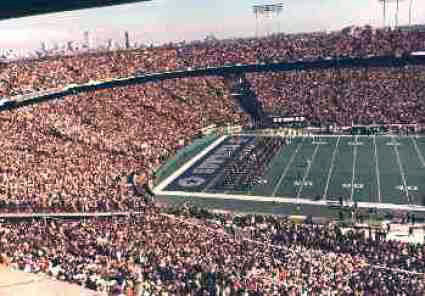
Tulane Stadium
1971 Miami Dolphins
| # |
Player |
Pos. |
Hgt. |
Wgt. |
College |
Exp. |
| 1 |
Garo Yepremian |
K |
5-8 |
175 |
None |
6 |
| 10 |
George Mira |
QB |
6-0 |
190 |
Miami (FL) |
8 |
| 12 |
Bob Griese |
QB |
6-1 |
190 |
Purdue |
5 |
| 13 |
Jake Scott |
FS |
6-0 |
188 |
Georgia |
2 |
| 20 |
Larry Seiple |
P |
6-0 |
215 |
Kentucky |
5 |
| 21 |
Jim Kiick |
RB |
5-11 |
215 |
Wyoming |
4 |
| 22 |
Mercury Morris |
RB |
5-10 |
190 |
West Texas A&M |
3 |
| 25 |
Tim Foley |
CB |
6-0 |
195 |
Purdue |
2 |
| 26 |
Lloyd Mumphord |
CB |
5-10 |
175 |
Texas Southern |
3 |
| 31 |
Terry Cole |
RB |
6-2 |
220 |
Indiana |
3 |
| 32 |
Hubert Ginn |
RB |
5-10 |
185 |
Florida A&M |
2 |
| 39 |
Larry Csonka |
FB |
6-3 |
235 |
Syracuse |
4 |
| 40 |
Dick Anderson |
SS |
6-2 |
195 |
Colorado |
4 |
| 42 |
Paul Warfield |
WR |
6-0 |
190 |
Ohio State |
8 |
| 45 |
Curtis Johnson |
CB |
6-1 |
195 |
Toledo |
2 |
| 48 |
Bob Petrella |
S |
5-11 |
190 |
Tennessee |
6 |
| 53 |
Bob Matheson |
LB |
6-4 |
240 |
Duke |
5 |
| 56 |
Jesse Powell |
LB |
6-2 |
220 |
West Texas A&M |
3 |
| 57 |
Mike Kolen |
LB |
6-2 |
220 |
Auburn |
2 |
| 59 |
Doug Swift |
LB |
6-3 |
225 |
Amherst |
2 |
| 61 |
Bob DeMarco |
C |
6-2 |
250 |
Indiana, Dayton |
11 |
| 62 |
Jim Langer |
OL |
6-2 |
250 |
South Dakota State |
2 |
| 66 |
Larry Little |
G |
6-1 |
265 |
Bethune-Cookman |
5 |
| 67 |
Bob Kuechenberg |
G |
6-2 |
255 |
Notre Dame |
2 |
| 70 |
Jim Riley |
DE |
6-4 |
250 |
Oklahoma |
5 |
| 71 |
Frank Cornish |
DT |
6-4 |
280 |
Grambling State |
6 |
| 72 |
Bob Heinz |
DT |
6-6 |
265 |
Pacific |
3 |
| 73 |
Norm Evans |
T |
6-5 |
250 |
TCU |
7 |
| 74 |
John Richardson |
DT |
6-3 |
245 |
UCLA |
5 |
| 75 |
Manny Fernandez |
DT |
6-2 |
250 |
Utah |
4 |
| 77 |
Doug Crusan |
T |
6-5 |
250 |
Indiana |
4 |
| 79 |
Wayne Moore |
T |
6-6 |
265 |
Lamar |
2 |
| 80 |
Marv Fleming |
TE |
6-4 |
230 |
Utah |
9 |
| 81 |
Howard Twilley |
WR |
5-10 |
185 |
Tulsa |
6 |
| 82 |
Otto Stowe |
WR |
6-2 |
190 |
Iowa State |
1 |
| 84 |
Bill Stanfill |
DE |
6-5 |
250 |
Georgia |
3 |
| 85 |
Nick Buoniconti |
LB |
5-11 |
220 |
Notre Dame |
10 |
| 86 |
Vern Den Herder |
DE |
6-6 |
250 |
Central College (IA) |
1 |
| 88 |
Jim Mandich |
TE |
6-2 |
225 |
Michigan |
2 |
| 89 |
Karl Noonan |
WR |
6-2 |
200 |
Iowa |
6 |
|
1971 Dallas Cowboys
| # |
Player |
Pos. |
Hgt. |
Wgt. |
College |
Exp. |
| 10 |
Ron Widby |
P |
6-4 |
210 |
Tennessee |
4 |
| 12 |
Roger Staubach |
QB |
6-3 |
195 |
Navy |
3 |
| 14 |
Craig Morton |
QB |
6-4 |
215 |
California |
7 |
| 19 |
Lance Alworth |
WR |
6-0 |
185 |
Arkansas |
10 |
| 20 |
Mel Renfro |
CB |
6-0 |
190 |
Oregon |
8 |
| 22 |
Bob Hayes |
WR |
6-0 |
185 |
Florida A&M |
7 |
| 26 |
Herb Adderley |
CB |
6-0 |
205 |
Michigan State |
11 |
| 30 |
Dan Reeves |
RB |
6-1 |
200 |
South Carolina |
7 |
| 31 |
Gloster Richardson |
WR |
6-2 |
200 |
Jackson State |
5 |
| 32 |
Walt Garrison |
RB |
6-0 |
205 |
Oklahoma State |
6 |
| 33 |
Duane Thomas |
RB |
6-1 |
220 |
West Texas A&M |
2 |
| 34 |
Cornell Green |
S |
6-3 |
210 |
Utah State |
10 |
| 35 |
Calvin Hill |
RB |
6-4 |
225 |
Yale |
3 |
| 37 |
Ike Thomas |
CB |
6-2 |
195 |
Bishop |
1 |
| 41 |
Charlie Waters |
S |
6-1 |
195 |
Clemson |
2 |
| 42 |
Claxton Welch |
RB |
5-11 |
205 |
Oregon |
3 |
| 43 |
Cliff Harris |
S |
6-0 |
190 |
Ouachita Baptist |
2 |
| 50 |
D.D. Lewis |
LB |
6-1 |
225 |
Mississippi State |
4 |
| 51 |
Dave Manders |
C |
6-2 |
250 |
Michigan State |
8 |
| 52 |
Dave Edwards |
LB |
6-1 |
225 |
Auburn |
9 |
| 54 |
Chuck Howley |
LB |
6-3 |
230 |
West Virginia |
14 |
| 55 |
Lee Roy Jordan |
LB |
6-1 |
220 |
Alabama |
9 |
| 56 |
Thomas Stincic |
LB |
6-4 |
230 |
Michigan |
3 |
| 61 |
Blaine Nye |
G |
6-4 |
250 |
Stanford |
4 |
| 62 |
John Fitzgerald |
C |
6-5 |
255 |
Boston College |
1 |
| 63 |
Larry Cole |
DE |
6-5 |
250 |
Air Force, Hous., Hawaii |
3 |
| 64 |
Tony Liscio |
T |
6-5 |
265 |
Tulsa |
9 |
| 66 |
George Andrie |
DE |
6-6 |
250 |
Marquette |
10 |
| 67 |
Pat Toomay |
DE |
6-5 |
245 |
Vanderbilt |
2 |
| 70 |
Rayfield Wright |
T |
6-6 |
255 |
Fort Valley State |
5 |
| 73 |
Ralph Neely |
T |
6-6 |
265 |
Oklahoma |
7 |
| 74 |
Bob Lilly |
DT |
6-5 |
260 |
TCU |
10 |
| 75 |
Jethro Pugh |
DT |
6-6 |
260 |
Elizabeth City State |
7 |
| 76 |
John Niland |
G |
6-3 |
245 |
Iowa |
6 |
| 77 |
Bill Gregory |
DT |
6-5 |
255 |
Wisconsin |
1 |
| 79 |
Forrest Gregg |
T |
6-4 |
250 |
SMU |
16 |
| 83 |
Mike Clark |
K |
6-1 |
205 |
Texas A&M |
9 |
| 85 |
Tody Smith |
DE |
6-5 |
250 |
Michigan St., USC |
1 |
| 87 |
Billy Truax |
TE |
6-5 |
240 |
LSU |
8 |
| 89 |
Mike Ditka |
TE |
6-3 |
230 |
Pittsburgh |
11 |
|
References: Dallas Cowboys: Winning the Big One, Steve Perkins (1972)
Journey to Triumph: 110 Dallas Cowboys Tell Their Stories, Carlton Stowers (1982)
God's Coach: The Hype, & Hypocrisy of Tom Landry's Cowboys, Skip Bayless (1990)
Cowboys Have Always Been My Heroes: 1960-1989 The Definitive Oral History of America's Team, Peter Golenbock (1997)
America's Game: The Epic Story of How Pro Football Captured a Nation, Michael MacCambridge (2004)
The Football Game I'll Never Forget: 100 NFL Stars' Stories, as told to the editors of Football Digest (2004)
The Super '70s: Memories from Pro Football's Greatest Era, Tom Danyluk (2005)
Game of My Life Dallas Cowboys: Memorable Stories of Cowboys Football, Jean-Jacques Taylor (2006)
A Cowboy's Life, Bob Lilly with Kristine Setting Clark (2008)
The Ultimate Super Bowl Book, Bob McGinn (2009)
Breathrough 'Boys: The Story of the 1971 Super Bowl Champion Dallas Cowboys, Jaime Aron (2011)
The Dallas Cowboys: The Outrageous History of the Biggest, Loudest, Most Hated, Best Loved Football Team in America:
Joe Nick Patoski (2013)
The NFL, Year One: The 1970 Season and the Dawn of Modern Football, Brad Schultz (2013)
50 Years, 50 Moments: The Most Unforgettable Plays in Super Bowl History, Jerry Rice and Randy O. Williams (2015)
Sports Illustrated Super Bowl Gold: 50 Years of the Big Game (2015)
|
|


























